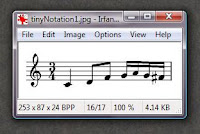Birth Announcements and Other Current Events
Version 1.6.0 of music21, the noted suite of tools for computer-aided research, was released by Michael Cuthbert, Christopher Ariza, and their MIT team on August 8. (The previous versions 1.5 and 1.4 appeared in May and January.) It’s a robust environment of programming modules, where “straightforward tasks such as displaying or playing a short melody, getting a twelve-tone matrix, or converting from Humdrum’s Kern format to MusicXML can each be accomplished with a single line of code.” Take a look. (The musical example, the first in the demo, shows the product of one such “simple line of code.”)
The all-new Music21 Documentation is the work of Josiah Wood Oberholzer and can be, given the idiom, a fetching read: “How do I ask a question so that it becomes frequently asked?” begins the FAQ unit. Answer: “Don’t you hate FAQs that are not based on anything anyone’s ever asked? To ask, post to http://groups.google.com/group/music21list. But first read what we’ve already come up with below.”
Q: “What is the native music21 data format?” A: “There is none, but it doesn’t matter.”
Speaking of musical examples, we hope to treat them, in the general context of life after Finale and Sibelius, in a forthcoming post that considers the worlds of LilyPond, MusScore, MusicXML, and the like.
| Mamoulian |
Joe Horowitz’s book on Rouben Mamoulian and Porgy and Bess was published on July 29: “On My Way”: The Untold Story of Rouben Mamoulian, George Gershwin, and Porgy and Bess (W. W. Norton). Mamoulian, who went on to stage Carousel and Oklahoma!, figured importantly in Horowitz’s Artists in Exile (HarperCollins, 2009). Spoiler alert: things went downhill for him (M., not H.) from there.
Meanwhile in London, the Southbank Centre’s year-long theme/festival, The Rest Is Noise, embarks on its second half by commemorating the Britten Centenary in events scheduled for 27 September–12 October. The remainder of the year considers classical music in the aftermath of World War II. It’s a dandy partnership involving the London PO, The Guardian (free PR), BBC 4, and The Open University. Among the speakers Alex Ross is of course front and center, but also Nuria Schoenberg-Nono, Frances Stonor Saunders (Who Paid the Piper? on the CIA and the Cultural Cold War), Angela Davis, and Steve Reich.
The week brought more bad news for music journalism from the Cleveland Plain-Dealer, Village Voice, and the (London) Sunday Independent; really big news from the Boston Globe and Washington Post; and a fine riff on modern media from Doonesbury last Sunday. Two big opera stories made the daily press and lit up the web: the booing of Frank Castorf’s production of the Ring in Bayreuth (copulating crocs, Siegfriend’s machine gun) and Thomas Hampson’s enviably cool responses on BBC-TV to unspeakably silly badgering—and generally bad manners—of the kind that characterizes American daily rants, aka cable news. We mean to follow up on both stories.
The loquacious maestro Hampson is, as somebody put it a long time ago, one of the good guys; for musicology, that includes having established a Thomas Hampson Fund meant to foster editions and scholarship on classic song in all its contexts. And, by the way, the trailer for Simon Boccanegra (why Hampson was in London to begin with) shows a more comely facet of the new media.


